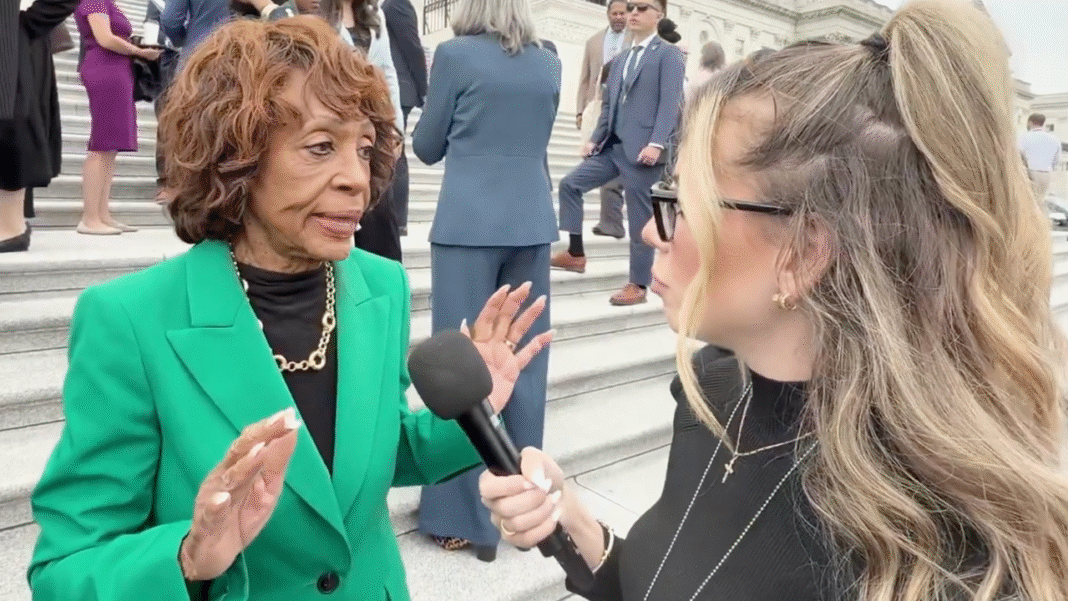Tensions on Capital Hill: Maxine Waters vs. a Pro-MAGA Reporter
U.S. Representative Maxine Waters, a prominent figure in California politics and a long-standing member of Congress, recently found herself at the center of a heated exchange on the steps of the U.S. Capitol. This confrontation took place amid the looming threat of a government shutdown. Waters was addressing members of the press following a Democratic caucus news conference when she was approached by Alison Steinberg, a reporter from the pro-MAGA outlet LindellTV.
The Shutdown Dilemma
The government shutdown, which began early on a Wednesday, raised critical concerns about the implications for American workers. Steinberg directed Waters with a provocative question: Did Democrats prioritize the healthcare of undocumented immigrants over the wellbeing of American citizens during the government crisis? She asserted that if the government were to shut down, many American workers would face furloughs.
Waters, known for her assertive demeanor, quickly countered. “Excuse me. Stop it right there,” she interjected. Her response reflected a strong defensive posture, emphasizing that the aim was to keep the government operational and to engage in bipartisan discussions with Republicans. She underscored that healthcare remained a primary focus for her party, particularly in light of the pressing issues at hand.
The Political Battlefield
At the center of this political standoff lies a critical debate over healthcare funding, particularly concerning the future of tax credits associated with the Affordable Care Act (ACA). The credits, introduced during the pandemic, are vital for ensuring that many Americans have affordable access to healthcare. Waters pointed out that Republicans are resistant to extending these credits and are also pushing back against efforts to restore significant cuts to Medicaid and Medicare instituted under previous Republican administrations.
Despite the heated rhetoric from the right, the facts surrounding healthcare access for undocumented immigrants reflect the complexities of U.S. immigration law. While critics, including former President Donald Trump and his supporters, have accused Democrats of extending taxpayer-funded healthcare to illegal immigrants, the reality is that federal law prohibits such practices. Legal residents, including refugees and asylum seekers, are the exceptions, highlighting a nuanced debate often oversimplified in political discourse.
Waters Stands Firm
As Steinberg pressed Waters further, questioning whether Democrats indeed demanded healthcare for undocumented immigrants, Waters maintained her stance: “Democrats are demanding healthcare for everybody.” Her commitment to healthcare access was clear and steadfast. She expressed a deep concern for lives at stake, reiterating the party’s belief that health services should be available to all individuals—citizens and non-citizens alike—who require assistance.
Waters wasn’t deterred by Steinberg’s attempts to frame her responses in a more divisive light. “Quit it! Stop it!” she exclaimed, criticizing the reporter’s approach to journalism as “divisive” and “creating controversy.” This exchange underscored the broader tension between political objectives and media narratives, where soundbites often overshadow substantive policy discussions.
The Broader Implications for Healthcare Policy
Waters’ comments come amid ongoing debates about the implications of potential cuts to Medicaid and ACA subsidies. According to the Congressional Budget Office, if these cuts are enacted, an estimated 16 million people could lose their health insurance by 2034, accentuating the urgency of the policy discussions at hand.
The backdrop of this confrontation also includes LindellTV’s connection to Mike Lindell, known for his strong alignment with Trump and for propagating theories related to election fraud. This association raises questions about the motives behind such confrontations and the framing of political narratives in contemporary media.
Engaging with the Public
This exchange between Waters and Steinberg reflects a broader trend in political journalism, where reporters often aim to highlight controversies to provoke reactions. For Waters, the moment was not just about defending her party’s stance but also about combating a narrative she finds harmful to effective discourse. Her passionate defense of universal healthcare emphasizes an ongoing struggle in American politics: balancing the need for compassion with deeply entrenched party divisions.
Although the government shutdown looms large over Congress, it was this brief but impactful interaction that encapsulated the complexities of healthcare, immigration, and the charged environment within which today’s politicians operate.



